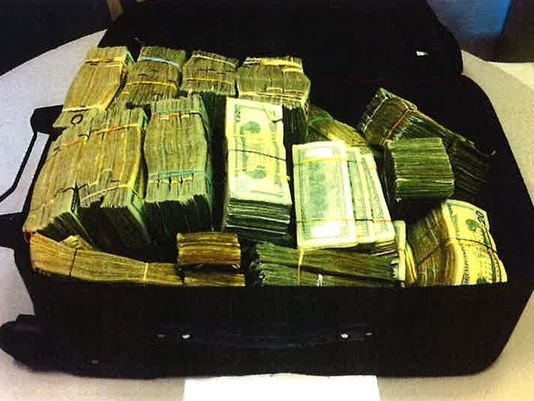This sunny Florida town has a shady reputation for fueling America’s illegal drug trade
This sunny Florida town has a shady reputation for fueling America’s illegal drug trade
DORAL, Fla. — In a leafy office park in the suburbs west of Miami, local undercover officers set up an elaborate sting inside the Sevilla Trading Corporation.
Beyond the neatly furnished front office, a courier working for drug dealers carted in a shoe box stuffed with thousands in drug cash collected on street corners in cities across the country.
A police informant counted the cash in a back room, divided it, then delivered it to computer stores down the street in the first step toward turning the dollars into pesos and sending them to drug kingpins in Colombia.
The investigation in Doral in 2002 was supposed to crack down on rampant laundering in the area and shut down the businesses taking in drug money. But in the following years, just the opposite happened.
Internal police records reviewed by USA TODAY Network show the drug groups quietly turned Florida’s fastest-growing suburb into a money laundering haven that has empowered the largest criminal organizations in the Americas to hide their illicit profits and dominate the narcotics trade in the United States.
Twelve miles from the looming skyscrapers of downtown Miami, the criminal groups have moved millions of dollars though the little-known maze of office parks just blocks from the prestigious golf course that bears President Trump’s name.
With the nation steeped in a heroin epidemic — thousands of overdose deaths each year — the laundering has allowed the criminal groups smuggling the drug into the United States to get their money out of the country once the narcotics are sold.
“It’s absolutely critical to them,” said John Tobon, an agent for the Department of Homeland Security in Miami.
In a community known mostly as a getaway from the urban problems of Miami, the flood of drug money has confounded law enforcement agencies.
"We always thought we would get to it at some point,” said Charlie Blau, a former federal prosecutor who oversaw the first money laundering sting in Miami. "We knew it would be a bigger problem.”
Federal agents say the criminal organizations use many methods to launder their money, including overseas bank wires and cash smuggling over the border.
They also have turned to other laundering areas, like the garment district in Los Angeles and the jewelry centers in New York City, to clean millions in drug profits.
But the export shops west of Miami remain among the oldest conduits in the country to launder money — and the most difficult to infiltrate and shut down.
Twice, local law enforcement task forces targeted the area, but no business owners were arrested nor were their shops closed.
Internal records of the most recent sting operation, in 2012, show for the first time the stunning amount of money that moved through the businesses and their importance to powerful drug organizations.
Tens of thousands in cash bundles were dropped off at a cellphone outlet tucked inside an aging storage center on the edge of town. Hundreds of thousands were wired into the bank account of a computer store with a glitzy showroom on one of Doral's busiest thoroughfares.
In just three years, at least $25 million in drug money was funneled through 201 exporters by the police sting — just a fraction of the total number of businesses that were used to launder hundreds of millions in the past decade, according to records and former Drug Enforcement Administration (DEA) agents.
Suburb haven or money-laundering hub?
In a city that once hosted one of the PGA's famous tournaments, the activities have perplexed local leaders. "Obviously, it’s not good for Florida. It's not good for Doral,” said Mayor Juan Carlos Bermudez. “It’s not representative of the majority of the businesses we have here."
For decades, the vast area near Miami — a sprawling suburb of 52,000 people with gated communities and lakes — has been home to export shops that sprung up to meet a booming demand for laptops and cellphones in South America.
Because of the ample office and warehouse space near Miami International Airport — the largest cargo hub in the nation serving Latin America — the number of export shops mushroomed.
Not only was it an ideal place to do business, but in time, it also came to serve the purpose of the criminal groups.
Unlike traditional laundering that relied on the banks to hide ownership of the money, this was different.
Under a system known as the "black market peso exchange," the drug groups turned to the exporters to launder their cash and make it more difficult to track.
In deal after deal examined by USA TODAY Network, the officers picked up money in New York, Chicago and other cities — in duffel bags and suitcases — and flew it to South Florida, where they stashed it in a police trailer.
What followed was one of the largest undercover operations carried out in the country.
After getting orders, the police delivered the money to the Doral exporters to pay for goods ordered by retail stores in Colombia.
The retailers received the goods, and then paid back the cartel the equivalent amount — in pesos.
This sunny Florida town has a shady reputation for fueling America’s illegal drug trade
 Reviewed by Unknown
on
7:03 AM
Rating:
Reviewed by Unknown
on
7:03 AM
Rating:
 Reviewed by Unknown
on
7:03 AM
Rating:
Reviewed by Unknown
on
7:03 AM
Rating:










No comments